Table of Contents
With all the focus websites put on optimizing their sites for search engines, focus keywords are one SEO (Search Engine Optimization) element that’s often neglected. You may already be using focus keywords in your articles, but what you may not know is how to choose the best ones, and what makes a keyword effective.
To succeed as an online business or blog, you need to know what your audience is searching for and what they’re interested in. Then you can target their search terms with specialized content to get more traffic.
If you want to appear higher in the results, you’re going to need to do keyword research to find what people are looking for, and to learn which keywords are the likeliest to earn you more traffic.
In this article, we’ll help you master this skill by giving you the tools you’ll need, and showing you how to find the best ranking keywords and implement them into your content.
-Sound good? Then let’s take it away.
What is Keyword Research?
When you put a term into Google or any other search engine, it analyzes its indexed websites and decides which are the most relevant to your query. SEO increases your “relevance,” and makes you more likely to appear in the search results for the right inquiries.
One of the biggest factors that can affect your ranking is keywords. The closer the content on your page is to what the user has searched for, the more relevant (to them) it’s likely to be. But how can you know what people are searching for? That’s what keyword research is for.
Keyword research is heavily integrated with content marketing and blogging. It’s a core part of any marketing plan, and something every business and blogger should be doing. Targeting the search terms with the highest demand will help you put out content that’s relevant to your user base.
Like most things that boost your SEO and keep your website relevant, this isn’t something that you can do once and forget. Trends are always changing, and the search volume for certain keywords can drastically decline or dramatically spike at any time. Keyword research is an ongoing job, and you’ll need to do it every time you write a blog post, add a page to your site, or restructure any existing content.
Why Do Keyword Research?
So, keyword research is a lot of work, and something you’ll always need to keep an eye on. What exactly are you getting out of the deal?
If you want to succeed online, you’ll need to understand your audience. You may know a lot about your industry, but what users want and the things they’re interested in are constantly shifting. Their search terms provide insight into their thought processes. This is something that you can’t get anywhere else, and knowing how to harness this information will make your website successful.
When a user begins a search, they’re looking for an answer to something. This might appear as a direct question like “How do I install WordPress?”, general information about a topic, or where to purchase a specific product.
If you can target a keyword that has a high search volume and craft a page that answers this question, you will have earned a visit and possibly the trust of that visitor, — which could mean a conversion.

This is the core, not just of SEO, but of content marketing.
Find high-value keywords, craft great content in response, and use the trust you’ve just built to get a newsletter sign up or a sale on one of your products.
By doing keyword research, you’re getting insight into your target audience’s habits, the topics they’re looking up, and the related markets that might be of interest to your brand.
It also provides a pool of lucrative ideas for your blog and other content marketing efforts, for free. Search up a term like “how to WordPress” and you’ll get suggestions like “how to add pages?” or “how to edit WordPress footer?” These are free blog post ideas that you could target to earn more clicks.
Step 1: Use the Best Keyword Research Tools
To find the most effective keywords and decide which to use, you’re going to need some tools. These give you access to related search terms, and many offer other features like trend tracking, suggestions, and more.
- SEMrush – If you’re looking for a tool with more features, rather than use a research tool, try SEMrush. It gives you all the SEO stats related to any domain or keyword. However, the free account is pretty limited, allowing only ten searches (ten results) per day.
- Keyword Tool – If you just want a quick way to get a list of keywords without having to give up your email address, Keyword Tool gives you a huge list for free. It also supports eight different platforms, not just Google.
- Moz Keyword Explorer – Though it requires an email signup, Moz Keyword Explorer offers comprehensive information on every result. It’s all organized in a friendly visual diagram that’s easy to understand.
- Google Trends – Besides being totally free, Google Trends allows you to compare the popularity of several different search terms, show related queries, and visualize interest by region.
- QuestionDB – QuestionDB is unique in that, rather than providing search engine data, it shows what people have asked on forums like Reddit and StackExchange. This is an excellent source of content ideas.
- Ahrefs Keywords Explorer – This is a paid tool for those who are serious about SEO. It gives you data across ten search engines and helps you target the easiest keywords to rank for with the best payoff.
And don’t neglect one of the most important sources of related keywords: Google’s own search results. On every page, you’ll find the “People also ask” and “Searches related to” sections. You might not get any information on trends or search volume, but this is still valuable information.
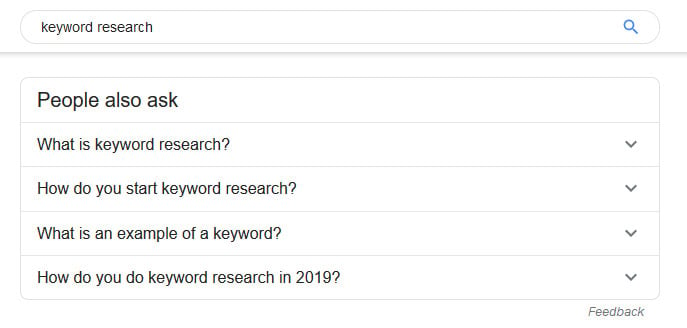
Step 2: Doing Keyword Research for Your Business
With your research tools gathered, it’s time to compile a list of topics that are related to your industry. Keyword tools don’t work well without material to use them with, so you’ll need to think up a few basic terms to analyze. This would be a good time to get out your notepad and write down everything because you’re going to be making a big list.
Start by jotting down every potential keyword you come across, everything that you can think of. You can always narrow it down later. Start by brainstorming and asking yourself questions like: What is your business all about? What are your goals? Who is your target audience? What do you provide your customers? What are they looking for?
If you’re a clothing retailer, you might end up with keywords like “clothing shop,” “clothes online,” “shirts for men,” and “eco-friendly boots.” These keywords are all drawn from the products or services that you sell, and what you aim to offer your customers. Most of what you think up will probably be short, one to three words long.
Besides content from your own business, you should also browse around the forums and Facebook groups that target consumers from your industry. You’ll find lots of threads and comments with questions, concerns, and discussions that could help you find things to focus on.

With the first draft of your list created, start adding each term individually into a keyword research tool. While doing this, make another list of results that look like they’re worth targeting. Keep an eye out for when your research tool offers extra analytics, and points out the terms with a moderate to high ranking and low competition.
By now you should have a rough list of keywords to include throughout your content. Let’s narrow it down a bit.
Step 3: Analyze Keyword Competition
Before you go sprinkling as many keywords as you can on your page, you should gauge the competitiveness of each term. You’re not the only person looking to boost your website’s ranking, and some keywords are more difficult to rank for than others.
Many keywords just aren’t worth the time you might spend on targeting them. Including them occasionally might not be a bad idea, but crafting content around them is a waste of resources. High-competition or low-traffic keywords are what you should usually avoid.
What makes a keyword high-competition? Usually, they’re dominated by large brands with more to dedicate to SEO than you or I can compete with. Hugely popular sites like Wikipedia, Amazon, and Youtube can’t be beaten down off the top ranking. And if the results are also filled with posts from high-profile minds from your industry, you’re going to have a hard time rising above them.
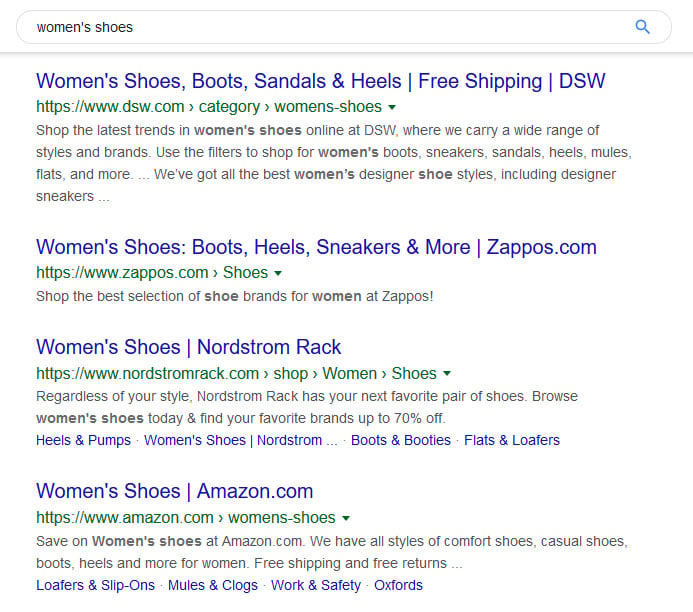
Some keywords will produce traffic that is too low to be worth pursuing. Low-traffic keywords are usually several words long, and difficult to mold content around because they are far too niche. Remember that if your term is showing a declining trend, you may want to avoid them.
The best keywords are those with high popularity and little competition. Scan the Google results page for the ones you’ve chosen. If you find that there are lots of low-quality results from Q & A sites and forums (e.g. Quora, Yahoo Answers), product listings from ecommerce websites, posts that are several years old, or small and poorly optimized blogs, these are the ones that you should be targeting first.
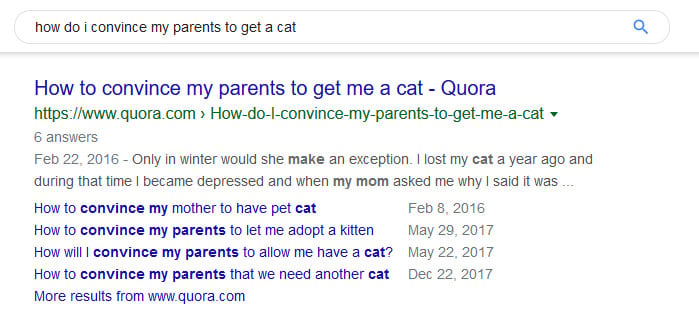
If you want to dig deeper, click on each result and identify the keywords they’re using. See if you can spot them in the headings and first paragraphs. You can also check the backlinks and website authority for these results to gauge how difficult it might be to surpass them.
The Importance of Long Tail Keywords
There are three types of keywords that you need to know about: short-tail (or head), mid-tail, and long-tail. As you might have guessed, these refer to the length of the graphic representation of each search term’s online presence.
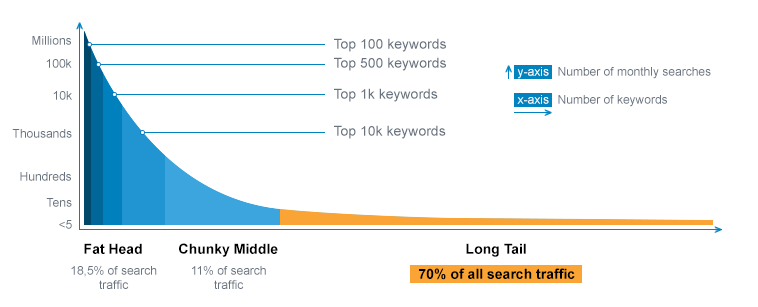
Head keywords are only one or two words long, such as “WordPress themes” for example. Because these are usually filled with results from high-profile brands, they are very hard to rank and give us very little insight as to what the user was initially searching for. Using this example, we can never know if the user’s intention was to search for downloadable WordPress themes, or to find a definition of themes, or if they are looking to find out which themes are the most popular?
Head keywords should appear naturally throughout the content on your website. Trying to use them to gain a higher ranking is often a futile effort.
Next come mid-tail keywords, usually 2-5 words long and easier to gauge the user’s search intent. A good example of which would be “best WordPress themes”. Even though this keyword range is only somewhat competitive, you’ll still have a much better chance of success using them. Mid-tail keywords with a lot of high-quality competition are usually easier to find.
Finally, we have long-tail keywords, which consist of five words or more, and very specific. In the example “List of best WordPress themes for writers”, the user’s intent is pretty obvious, while competition is quite low. On the other hand, finding quality long-tail keywords that are popular enough to be worth your time can also be difficult.
So which type of keyword should you go for?
If they have enough search volume (the number of searches within a certain period), targeting long-tail keywords is usually the best practice. Head keywords are just too short, competitive, and non-specific. These might be searched frequently, but breaking past the traction of popular brands is all but impossible. Bottom line, mid-tail and long-tail keywords are your best bet for reaching your target audience.
Step 4: Choosing a Focus Keyword
By now, you should understand how to search for keywords and be able to narrow down your results to those of the highest quality.
We still have to go over the process of choosing a focus keyword for your content.
Whenever you set out to optimize a post or a page on your website, you should do it using a focus keyword. This involves using a word or term that is used to evaluate the content on your page by comparing the relevance of the content to that word. When optimizing the SEO on your page, you should have at least one focus keyword.
This brings us to the biggest tip on the subject and the one that you should use to elevate your ranking.
Include your focus keyword in your page title, as well as in the first paragraph or introduction, and then very sporadically throughout the post itself.
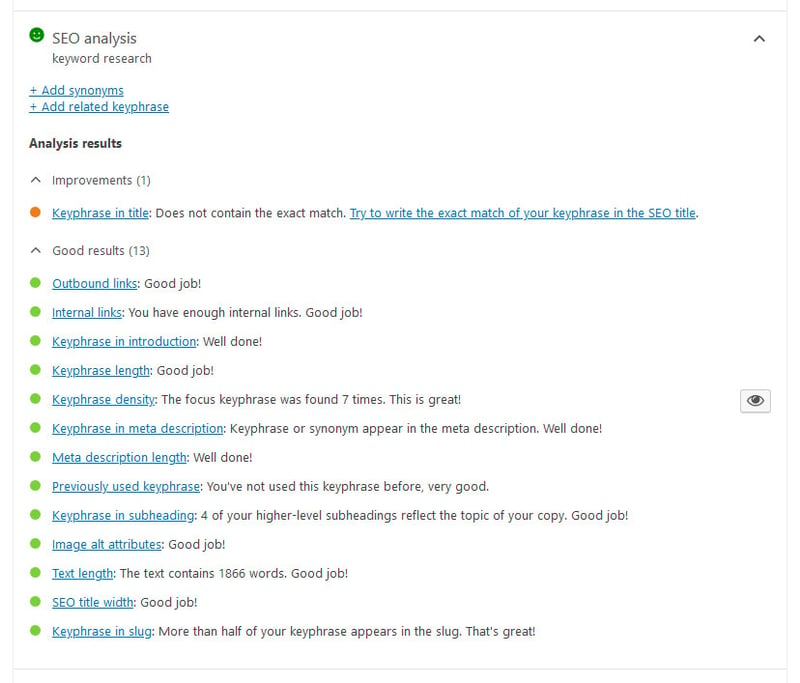
It’s also a good idea to include several other keywords. While these aren’t the focus of your article, they can still help you appear in the search results. Include a mix of short-tail and mid-tail keywords throughout your content.
Your focus keyword should be mid- or long-tail, with low competition, and high popularity. It should also be the one that has the most potential to draw in new traffic. However, feel free to include higher-competition and short-tail keywords throughout your content too. It can help your page appear more relevant to search engines.
You should also pick a focus keyword that helps you drive conversions. All this depends on what action you want your visitors to take. If you’ve chosen “best WordPress themes for writers” and you’re running a theme development business, this is a good choice because you’ll have a chance to promote your own services.
However, if you want to see the best results, your first goal when targeting any keyword should be to examine user intent and answer the questions that they’ve asked, rather than just include a random keyword because of its popularity.
Caution: Focus on User Intent First!
In the past, sites ranked higher based solely on keyword usage and frequency. This is no longer true. Google prioritizes content that is relevant and valuable, and that as a consequence, understands the intent behind a search.
The goal of content marketing is to provide users with valuable and interesting information. In exchange, you earn trust and authority among your audience and have the chance to draw in new users with SEO tactics like keyword research.
You could create low-quality content that ignores user intent and instead focuses on stuffing as many keywords as possible onto a page. However, this goes against content marketing’s entire philosophy, and you probably won’t gain anything by it.
Clicks mean nothing without conversions. Your site could appear at the very top of a search result for your target keywords, but if no one visits that page, or if it has a very high bounce rate, it means nothing. Don’t just include keywords randomly; aim to actually address the user’s potential questions and respond to the intent behind their search.
If for example, people searched for something like “free WordPress themes”, they’re usually looking for a theme to download. Targeting that keyword in an unrelated article, when you’re not satisfying that intent (by advertising your own free theme, creating a list of free themes, etc.) would be ignoring user’s intent for the sake of higher rankings.
By keeping user intent in mind, you’ll create more relevant content that will rank higher, and earn more trust from your new visitors too.
Use Better Keywords, Get More Visitors
It’s not good enough to create a website and hope the users come to you. And using low-quality keywords won’t do much for you either. Keyword research enables you to choose the best keywords and terms that your audience is using in their searches, while simultaneously publishing relevant content that will attract them straight to your website.
By properly using these tools and this advice, you’ll be able to use better focus keywords, placing them throughout your website, and crafting your content around them. It’s one of the best ways to improve your SEO and draw in more traffic. Target the right search terms and back it up with a great content marketing plan, and you’ll see your conversions rising in no time.
What is your favorite way of doing keyword research? Let us know in the comments section below.
Looking for fresh content?
By entering your email, you agree to receive Elementor emails, including marketing emails,
and agree to our Terms & Conditions and Privacy Policy.





